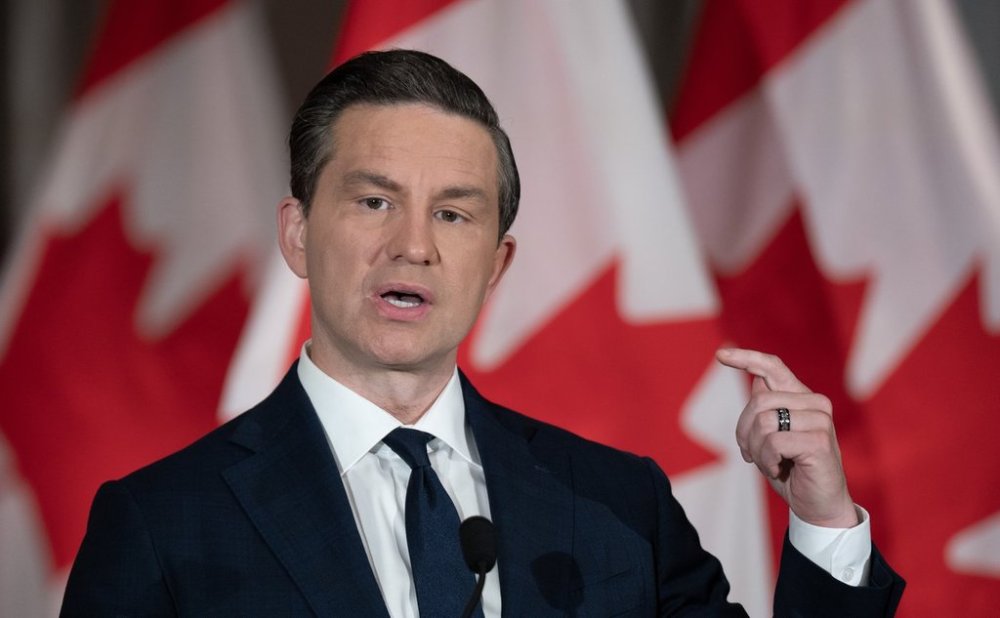Poilievre happy to keep old beater running, even if it’s stuck in reverse
Advertisement
Read this article for free:
or
Already have an account? Log in here »
To continue reading, please subscribe:
Monthly Digital Subscription
$1 per week for 24 weeks*
- Enjoy unlimited reading on winnipegfreepress.com
- Read the E-Edition, our digital replica newspaper
- Access News Break, our award-winning app
- Play interactive puzzles
*Billed as $4.00 plus GST every four weeks. After 24 weeks, price increases to the regular rate of $19.00 plus GST every four weeks. Offer available to new and qualified returning subscribers only. Cancel any time.
Monthly Digital Subscription
$4.75/week*
- Enjoy unlimited reading on winnipegfreepress.com
- Read the E-Edition, our digital replica newspaper
- Access News Break, our award-winning app
- Play interactive puzzles
*Billed as $19 plus GST every four weeks. Cancel any time.
To continue reading, please subscribe:
Add Winnipeg Free Press access to your Brandon Sun subscription for only
$1 for the first 4 weeks*
*$1 will be added to your next bill. After your 4 weeks access is complete your rate will increase by $0.00 a X percent off the regular rate.
Read unlimited articles for free today:
or
Already have an account? Log in here »
The federal Conservatives want to kill Ottawa’s electric vehicle mandate.
That’s their solution to the many challenges Canada faces in transitioning to a low-emissions transportation sector.
Conservative Leader Pierre Poilievre has made no secret of his disdain for the policy, which requires that all new light-duty vehicles sold in Canada by 2035 be either fully electric or plug-in hybrid. A phase-in period is scheduled to begin next year.

It’s Poilievre’s latest wedge issue — one he hopes will be as successful politically as the “axe the tax” campaign he waged against the Liberal government’s consumer carbon tax (which Prime Minister Mark Carney scrapped earlier this year).
Granted, there are legitimate concerns with Ottawa’s EV target, especially in a country with long winters, sprawling geography and a patchwork of inadequate charging infrastructure. But cancelling the mandate outright would be reckless, given what’s at stake with climate change.
Canada has already been experiencing the costly effects of global warming — out-of-control wildfires that are devastating communities coast-to-coast, extreme heat and more intense storms.
Transportation is the second-largest source of greenhouse-gas emissions in Canada, accounting for almost a quarter of the total. About half of those emissions came from cars and light passenger trucks in 2023.
If we’re serious about curbing those emissions, we can’t simply throw up our hands and stick with the status quo.
Expecting Canadians to embrace electric vehicles, including hybrid plug-ins, en masse without ensuring affordability, reliable performance in cold weather and easy access to charging stations is putting the cart before the horse.
That doesn’t mean the Liberal plan is flawless. Far from it. Ottawa has set an ambitious deadline but hasn’t fully equipped Canadians to meet it.
Expecting Canadians to embrace electric vehicles, including hybrid plug-ins, en masse without ensuring affordability, reliable performance in cold weather and easy access to charging stations is putting the cart before the horse.
For most Canadians, the biggest barrier to buying an EV today is price. While costs have come down in recent years, electric vehicles remain considerably more expensive than their gas-powered counterparts.
Ottawa had an EV rebate program, but the program ran out of money. There’s talk of bringing in a new one.
The second challenge is performance in Canada’s climate. Anyone who has driven or tested an EV in -30°C knows battery range drops significantly in the cold, sometimes by as much as 30 to 40 per cent. That’s not a minor inconvenience for Canadians who live in rural or northern regions, where driving distances are longer and charging stations are few and far between.
People need to know that their vehicle will get them from A to B reliably, even in the dead of winter. Manufacturers are making progress, but cold-weather performance is still a major hurdle that has to be overcome before Canadians can have full confidence in electric vehicles.

That leads directly to the third problem: infrastructure. Canada’s charging network is woefully inadequate. According to Natural Resources Canada, there are just under 30,000 public charging ports nationwide. That might sound like a lot, but the federal government estimates that Canada would need well over 600,000 charging ports by 2040 to meet the new mandate.
It’s not enough to have a token charging station in a small town off the highway. Drivers need the same kind of convenience they have today with gas stations — knowing they can charge quickly and get back on the road without planning their trip around charging stops.
Ottawa has committed to funding more charging stations, but the pace of expansion is nowhere near what’s required to meet the 2035 mandate.
None of these shortcomings should surprise anyone. Transforming an entire transportation sector in a country as large and diverse as Canada is not a simple task.
What’s disappointing is the lack of urgency in addressing them. Rather than tackling these challenges head-on — through stronger subsidies, cold-weather technology incentives and aggressive investment in charging infrastructure — the Liberals have spent more time trumpeting the target itself. Targets don’t reduce emissions. Real action does.
This is where the Conservatives could play a constructive role. But instead, they’ve chosen the easy political path of tearing down the mandate altogether. That might be an effective vote-getter in some quarters, but it’s dangerously short-sighted. It does nothing to address the broader climate crisis.
We can debate the feasibility of a 2035 deadline and the phase-in period leading up to it. Maybe it needs to be pushed back to 2040 to give technology and infrastructure time to catch up.
But eliminating the policy altogether would leave Canada further behind in a global transition that is already well underway.
The climate crisis doesn’t care about political lines or partisan preferences. It’s already costing Canadians billions in disaster recovery and insurance payouts.
The climate crisis doesn’t care about political lines or partisan preferences. It’s already costing Canadians billions in disaster recovery and insurance payouts, not to mention lives lost and communities destroyed.
Canadians deserve a serious conversation about how to make this mandate workable, not a political stunt that promises a return to business as usual. That means acknowledging the obstacles and crafting solutions that ordinary people can afford and trust.
Bring back meaningful subsidies. Accelerate investment in infrastructure. Incentivize research and development into cold-weather battery performance. And if the 2035 timeline proves unrealistic, adjust it.
What Canada can’t afford to do is simply give up.
tom.brodbeck@freepress.mb.ca

Tom Brodbeck is an award-winning author and columnist with over 30 years experience in print media. He joined the Free Press in 2019. Born and raised in Montreal, Tom graduated from the University of Manitoba in 1993 with a Bachelor of Arts degree in economics and commerce. Read more about Tom.
Tom provides commentary and analysis on political and related issues at the municipal, provincial and federal level. His columns are built on research and coverage of local events. The Free Press’s editing team reviews Tom’s columns before they are posted online or published in print – part of the Free Press’s tradition, since 1872, of producing reliable independent journalism. Read more about Free Press’s history and mandate, and learn how our newsroom operates.
Our newsroom depends on a growing audience of readers to power our journalism. If you are not a paid reader, please consider becoming a subscriber.
Our newsroom depends on its audience of readers to power our journalism. Thank you for your support.









